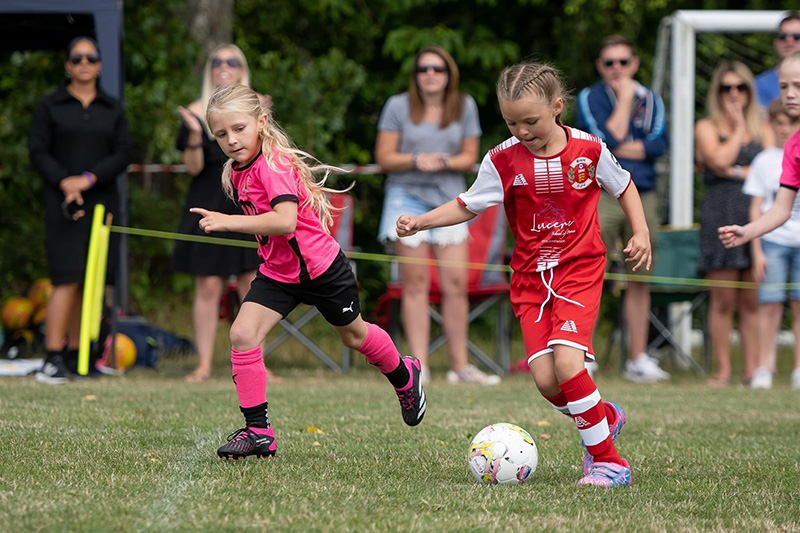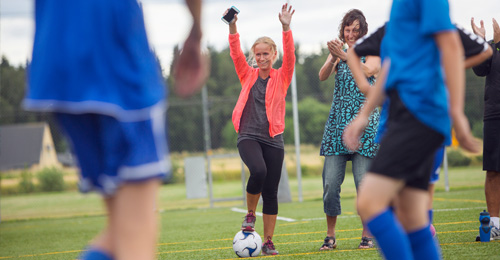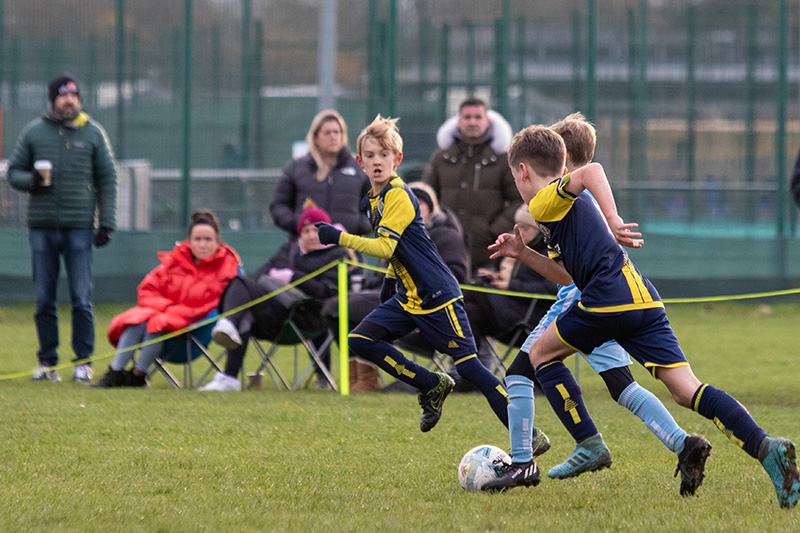Last Updated on: 6th November 2025, 09:39 am
How To Best Support and Encourage Young Players
Parents play an important role in their child’s sporting journey. A young player’s relationship with football shouldn’t just be about what happens on the pitch. You might not realise it, but you can influence how your child feels about playing for the rest of their lives. So, what should you do to help them have the best experience possible? This guide is full of tips and advice for helping your child as they progress through the sport.

How To Support Your Child
Your role is vital when it comes to helping your child thrive in their chosen sport. You want to find the right balance between supporting them and pushing them to reach their potential. Children pick up on everything, so your attitude will directly affect their motivation and confidence. Positive support will help them develop resilience, discipline, and a love of the game. On the other hand, too much pressure will create stress and a negative attitude towards football.
The best thing you can do is remain calm, supportive, and respectful. If you react negatively or angrily to certain aspects of the game, then it’s likely your child will do the same. Keep things simple and just enjoy the game. Don’t worry too much about the results and focus on the effort they put in. Take pride in their growth and show them how proud you are of everything they’re achieving.
Why Parental Support Matters
If you are involved in your child’s sporting journey, you can give them the best start possible. Your input can help:
- Enhance enjoyment: Your children are more likely to enjoy sporting activities if you show encouragement. Any positive reinforcement will help them feel valued and motivated. When you recognise their achievements, no matter how small, you boost their self-esteem and confidence.
- Improve performance: Focusing on constructive feedback instead of criticism can help your children improve. It will also foster a developmental mindset and resilience. Your positive reinforcement will reduce stress and anxiety. It will help them enjoy the sport as much as possible.
- Create a safe environment: If you’re actively engaged with your child’s sporting activities, you can ensure that they remain safe and happy throughout.
- Encourage positive behaviour: You can set a good example for your children. If you showcase good sportsmanship and positive behaviour, you’ll encourage them to do the same. This will help them build good relationships with their teammates and coaches, which is vital for their overall social development.
- Strengthen your relationship: On a basic level, showing an interest in their life will help improve your relationship. Your child will see that you are engaged with their passion and want to see them succeed. It will create strong memories and show support.
Creating the Right Environment
Obviously, everyone loves to win, but football should mainly be about fun, friendship, and developing as a player. Parents should try to create a supportive environment both on and off the pitch.
Before the match
- Help your child prepare properly. This includes getting enough sleep and a balanced diet.
- Talk to them about the match, but keep the conversations positive and light.
- Remind them not to worry too much about the result. They should focus on having fun and doing their best.
During the match
- Don’t just celebrate their goals or wins. Make sure you recognise their effort.
- Avoid shouting instructions to them. You’ll risk confusing them or increasing stress levels.
- Respect the referee, coach, supporters, and other players.
After the match
- Praise their effort and attitude throughout the match. Don’t just focus on the result.
- Ask them questions like “Did you enjoy the match?” and “What did you learn today?”
- Don’t criticise. Focus on encouragement and growth.
 Building Confidence Through Encouragement
Building Confidence Through Encouragement
Younger players can often struggle with confidence, especially when they’re still learning. The way you react to their mistakes can have a big impact. Mistakes are an essential part of the learning process, so they shouldn’t be dismissed. Simply saying “I’m proud of how you kept going” is more valuable than focusing on what went wrong.
As a parent, you want to encourage your children to take risks and try new things. This will help them grow and become stronger players. They can’t be afraid of making mistakes or disappointing anyone. If you emphasise their effort, it will reinforce their resilience and give them a stronger mindset.
Avoid Comparisons With Other Children
Every child has a unique football journey and will develop at different paces. Patience and realistic expectations are important to ensure that players develop properly and keep having fun. With the right support, young players will be able to learn at their own pace and enjoy their experience.
Comparing your child with other players will create unnecessary stress and anxiety. If you focus too much on what other children are doing, then your own child will do the same. Focus on how well your child is developing and highlight key achievements. Don’t worry too much about what everyone else is doing. If you have any real concerns, approach the coach and discuss them.
Work With the Coach
Parents and coaches should work together to help young players develop. This is the best way to ensure that they thrive. You might think that you know what’s best for your child, but you don’t want to go against what the coach is saying. That will only lead to confusion or worse. Your child should respect and listen to their coach, so you need to do the same.
Show your support for your child’s coach by:
- Trusting their decisions and respecting their methods.
- Avoiding shouting instructions from the sidelines or undermining their choices.
- Engaging in constructive communication if you have a problem. Don’t get aggressive.
- Volunteering to help out the coach if you can.
When you show support for the coach, it shows consistency for players. They will see that everyone is working towards the same goal. If you have a positive attitude toward the coach, so will your child. Any negativity between you and the coach will directly affect your child.

Helping Your Child Handle Wins and Losses
Football is full of highs and lows. You need to know how best to respond to both of these outcomes.
After a win:
- Don’t just focus on the result. Instead, celebrate effort and teamwork.
- Celebrate with the team, but keep them balanced. You want to avoid overconfidence.
After a loss:
- Acknowledge their disappointment but remind them to keep it in perspective.
- Focus on what went well and how they can use the result going forward.
- Reinforce that losing is part of the game and is a good chance to improve.
Read our blog for more tips on how to help young players deal with defeats in football.
Encourage Respect and Good Sportsmanship
You play an important role in teaching your child values like respect, teamwork, and fairness. Your kids will mirror your behaviour, so keep that in mind when interacting with people. Young players will notice how their parents treat referees, opponents, and teammates. Make sure you show respect at every match, regardless of the result. Encourage your child to shake hands, thank the referee, and be gracious in victory and defeat. This will help build character both on and off the pitch.
Maintain Balance in Their Life
Young players can easily get caught up in football’s competitive nature. However, they need balance. Make sure that they understand that rest, schoolwork, and social time are just as important as training. You want to encourage them to train at home, but you also have to ensure they leave time for other things.
You can help by:
- Managing their schedule to avoid taking on too much.
- Encouraging wider interests outside of football.
- Making sure that enjoyment comes before everything else.
A balanced player is a happy player, and happiness will be the key to a long-term passion for the sport.
The Bigger Picture
As much as you might want your child to end up playing for England, the reality is that not every young player will go on to play professional football. Remember that football is about more than just moulding elite athletes. It’s about developing confident, healthy, and respectful young people. Your role is to help make football a positive and memorable part of your child’s life. Encouraging and supporting them will help your child grow into a resilient and motivated person.
Your role is about more than just shouting from the sidelines. You should be guiding and celebrating progress. You want your child to feel safe, able to make mistakes, learn, and have fun. Your attitude can affect their confidence and passion for the game. Make sure you do everything you can to help your child create happy memories.
Tags: advice for parents, children, Football advice, junior football, mental health, youth football